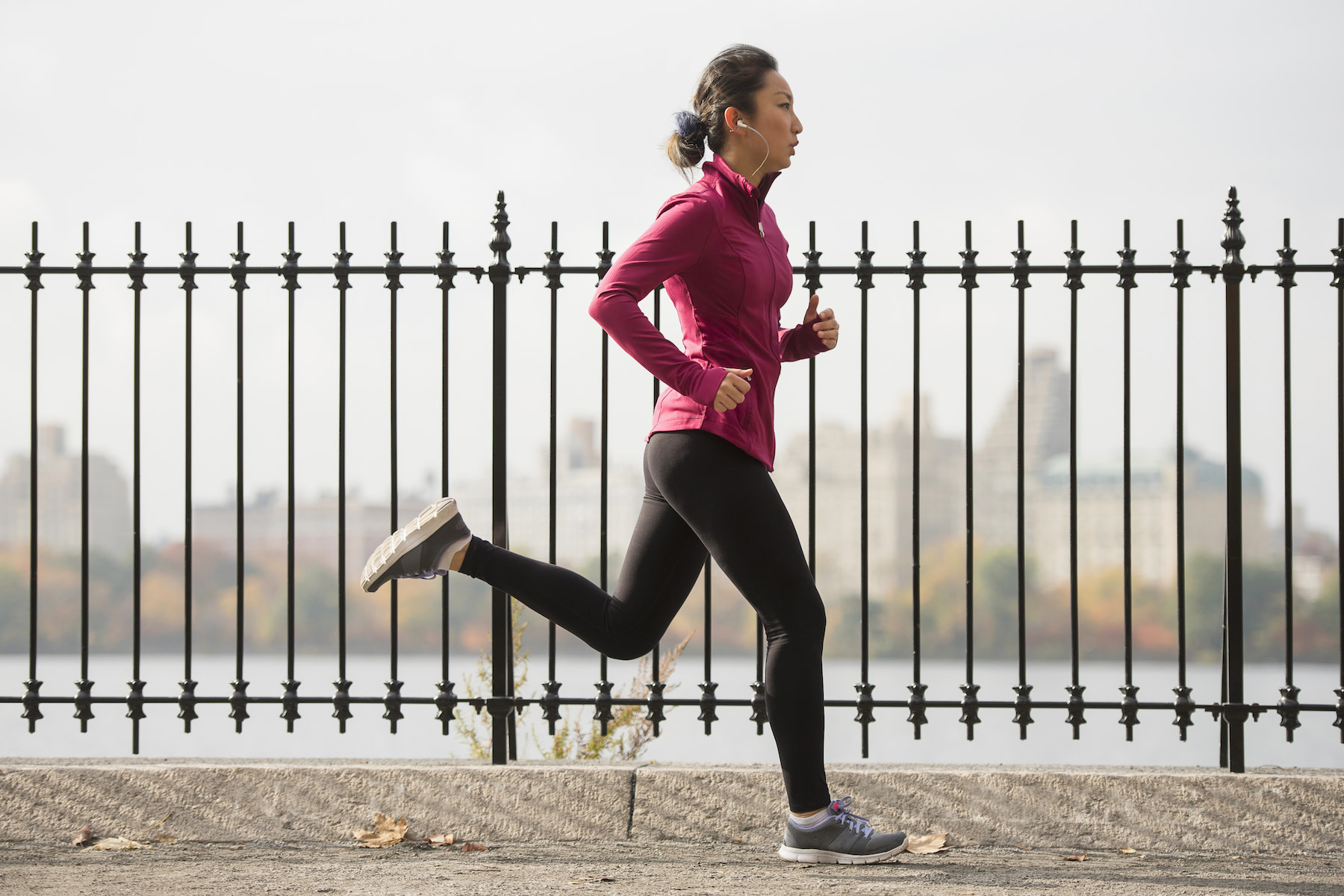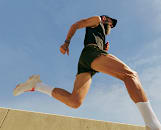
JGI/Tom Grill/Tetra images via Getty Images
Why Do My Legs Feel Heavy When I Run?
The experts break down eight common causes of this sensation.
By Natalie Arroyo Camacho•
What Heavy Legs Feel Like
8 Reasons Why Your Legs May Feel Heavy When You Run
8 Ways to Avoid This Heavy Legs Feeling
Should You Skip Your Run if Your Legs Start to Feel Heavy?
You’re heading out on your run when an uncomfortable feeling gives you pause: cramps, aches, maybe even some soreness. If you’re a regular exerciser, you’re likely familiar with this scenario. But there’s one sensation that all runners can relate to and rarely know how to handle: when your legs feel especially heavy or tired. But why do your legs feel heavy when you run?
Discover more ways to reach your goals with Peloton
Having heavy or tired legs is usually an innocuous feeling, but there are times when this could signal something more severe. “Maybe you're doing something that’s really inefficient, and your legs pay the price for that,” says Douglas Wisoff, a physical therapist and the founder of Radiant Running—a Colorado-based physical therapy clinic for runners.
But how can you tell when this feeling is a sign of something more serious—and when it's something you can shake off? Below, experts explain what heavy legs feel like, the factors that can lead to them, and how to (mostly) prevent this common sensation.
What Heavy Legs Feel Like
Generally, heavy legs feel like they “have literally become heavy to lift with each step,” says Peloton instructor Becs Gentry. This sensation may slow down your run and make it feel more tiresome than it should, she adds.
You might also feel sluggish, adds Eli Lamberson, a physical therapist. “[Your] legs might feel slightly numb or like they're not responding as quickly or efficiently as one expects,” he says. However, it's worth noting that this sensation is different from “acute pain or injury discomfort,” he adds.
While this feeling can occur at the beginning, middle, or end of your run, when it happens matters. “Feeling it at the start [of your run] might suggest inadequate warm-up or previous fatigue,” Lamberson says. “Experiencing it in the middle or end can indicate fatigue, dehydration, or nutritional deficits.”
8 Reasons Why Your Legs May Feel Heavy When You Run
Here, these experts explore more of the factors that can contribute to this type of discomfort.
1. You Had a Tough Workout
A “challenging workout” can cause your legs to feel heavy on subsequent runs, Becs says. The sensation is akin to delayed onset muscle soreness—which develops 12 to 24 hours after you exercise and may produce the greatest pain 24 to 72 hours post-workout.
2. Inadequate Nutrition and Hydration
Being undernourished may lead to low energy levels—which can also spur that heavy leg feeling, Lamberson says. This is particularly true if you’re not having enough carbohydrates, he adds. “Carbohydrates are a key energy source for runners, and not consuming enough can result in a lack of glycogen stores, leading to premature fatigue.”
Hydration also plays a crucial role in ensuring that your muscles are ready for a run. “Even mild dehydration can significantly impact performance,” Lamberson says. When you’re dehydrated, your heart has a hard time giving your muscles the oxygen and nutrients they need. This, in turn, can make your legs feel heavy.
3. Overtraining
When you’re a serious athlete, it can be hard to not overdo it in your training. “Pushing too hard without adequate rest can lead to muscle fatigue and soreness,” Lamberson says. If you want to avoid that heavy leg feeling, give yourself a rest day—and consider the intensity of your workout regimen.
4. Lack of Sleep
It’s no secret: Sleep is essential for recovery. “Without enough rest, your body can't repair muscle tissue or replenish energy stores effectively,” Lamberson says. This may also lead to fatigue on your runs.
5. Mental Fatigue
Mental fatigue often manifests physically, Lamberson says. Whether it’s a bad day at work, a frustrating personal problem, or the stress of training, you may see these negative thoughts creep into your physical sensations as you run. That “I just can’t do it” feeling may actually make your legs seem as though they’re wearing ankle weights—even though they’re not.
6. Poor Circulation
Hydration is just one factor that can lead to poor circulation—not the only one. There are also medical conditions that may affect your blood flow, such as diabetes and high blood pressure Lamberson says.“[They may] lead to a sensation of heaviness in the legs, as muscles aren't receiving all the oxygen and nutrients they need during activity,” he says. If you have such a condition, chat with your physician or a medical professional about the best course of action.
7. Not Having a Routine
Those spontaneous runs may actually make you more likely to have that heavy legs feeling—particularly if you're not taking into account your current fitness level, Becs says.
8. Neglecting Your Form
When your chest is sticking out or your back is arched, you’re in a tight posture, Wissof says. These positions can be indicative of poor form and may lead to feeling heaviness in your legs.
8 Ways to Avoid This Heavy Legs Feeling
Let’s be clear: Your legs will eventually feel heavy if you regularly hit the road or your Peloton Tread. In other words, there isn’t a way to completely prevent this sensation from happening. However, there are measures you can take to reduce the frequency of this feeling on your runs.
1. Take Time to Recover
There’s no understating the importance of recovery. The process helps loosen up your muscles and break up any lingering soreness. For a passive recovery, think about sitting in a sauna, taking a hot bath, or getting a massage. If, on the other hand, you’re looking for a more active recovery, consider trying a low-impact ride, taking a walk, or going for a swim.
2. Nourish and Hydrate Your Body
Your body expends a lot of energy when you’re running. As a result, it’s important that you’re properly nourished and adequately hydrated. Lamberson suggests “eating a balanced diet rich in carbohydrates, proteins, and fats,” as well as staying well-hydrated before, during, and after your runs.
3. Incorporate Cross Training
It’s understandable that you may not want to take a break from your regular runs. However, if you push your muscles to the brink through overuse, you’ll likely start feeling that heavy legs sensation on subsequent runs. “Include low-impact cross-training activities, such as cycling or swimming, to build endurance and strength without overtaxing your legs,” Lamberson says.
4. Get Enough Sleep
Aim to bank between seven and night hours of shut-eye a night. This gives your body the proper amount of time for your muscle tissue to recover, Lamberson says.
5. Practice Mindfulness Techniques
You may have a mental block that’s causing your legs to feel tired or heavy. (It happens.) To help release some of those stressors, Lamberson recommends trying some mindfulness techniques, such as meditating, journaling, and practicing breathing exercises.
6. Don’t Skip Your Warm-Up or Cooldown
Similar to how you might let your car warm up before driving it, you need to let your muscles know that you’re about to take them for a run. Lamberson recommends starting with a dynamic warm-up, such as leg swings, side lunges, and high knees. After you’ve completed your run, make sure you cooldown. This part of the recovery process will help prepare your muscles for future exercise sessions by aiding in your recovery, he says.
7. Stick to a Routine
If you don’t have a running routine, it’s hard to tell what your limits are. In other words, it’s difficult to determine and plan around your fitness level. Can you run one mile? Three? Five? And at what pace? This is why Becs strongly encourages you to find your routine and stick to it.
“Getting into a regular routine will really help your body adapt to the training and familiarize itself with the usage of muscles and energy—therefore, hopefully, alleviating the chances of regular heavy leg syndrome,” Becs says.
8. Check Your Form
When you make contact with the Tread, trail, or pavement, your ears, shoulders, hips, and ankles should all be in a straight line. Avoid lifting your chin, pushing your pelvis back, or turning out your knees or ankles.
Should You Skip Your Run if Your Legs Start to Feel Heavy?
If your legs start to feel too heavy, you should definitely skip your run—and go see a professional. “This [is] especially important if the sensation of heaviness is accompanied by pain, as this could indicate an injury,” Lamberson says.

Peloton Treadmills
Two treadmills. One Peloton experience.
This content is for informational and educational purposes only and does not constitute individualized advice. It is not intended to replace professional medical evaluation, diagnosis, or treatment. Seek the advice of your physician for questions you may have regarding your health or a medical condition. If you are having a medical emergency, call your physician or 911 immediately.
Take your runs to the next level
Lace up and enter your email to get articles, instructor tips, and updates from Peloton sent to your inbox.
By providing your email address, you agree to receive marketing communications from Peloton.
For more about how we use your information, see our Privacy Policy.













